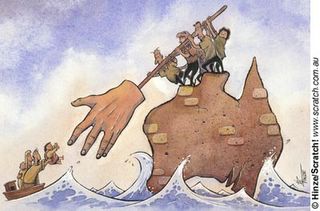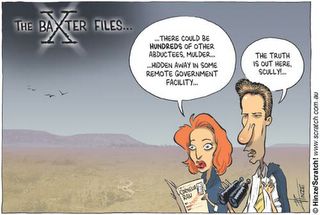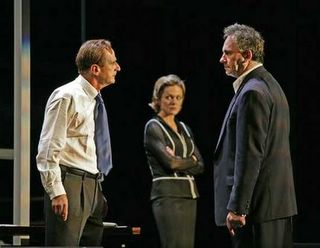
Do we have an island for you!!! (see the
Hinze archives)
Michael Gordon of The Age reports that the Howard Government will be asked this week to find a humanitarian solution for more than 50 asylum seekers who have spent "long enough" in detention on the tiny, cash-strapped island of Nauru. The request will come from Neill Wright, regional representative of the United Nations High Commissioner for Refugees, who spent several days on the island last week and found the asylum seekers in a desperate state.
"They are isolated. They are very desperate. They don't know what will happen in their future and it is probably the uncertainty, more than anything else, that is damaging for their mental health," Mr Wright, who returned to Australia on Friday, told
The Age. Mr Wright said the five children, in two Afghan families, and two Iraqi women were of particular concern. "This is not a place to bring up your children and it is not a place where you can plan for any future," he said.
He suggested a good solution would be for the asylum seekers, whose claims for refugee status have been rejected, to be accepted as migrants by Australia or other countries, with the numbers having no impact on refugee quotas.
The Age is the first newspaper to be given unfettered access to the camp. It interviewed more than half the asylum seekers the day before Mr Wright's visit. The common thread in all interviews was that these people were running on empty, their reserves of hope and resilience long gone.
Several inmates claimed to have new information supporting their claims. All said they could not return to their country of origin. Many said they could not sleep without medication. Referring to the
Age reports, Mr Wright said: "The situation there, as you quite clearly said in your articles, is not an acceptable one in humanitarian terms."
The 54 are the last of more than 1200 asylum seekers who have been held on Nauru since 2001. More than 700 have been resettled and some 470 more have voluntarily returned to their country of origin. Mr Wright said the 54 left were "between a rock and a hard place".
They genuinely believed they could not return to their country, but many were clinging to the hope that another round of adjudications would result in their being accepted as refugees. While Mr Wright said a "small percentage" of the cases might qualify for refugee status, his assessment was that the majority were migrants, given that the claims of most had been rejected more than once.
"My gut reaction is that there are one or two cases that need to be re-examined, but on the whole these people are migrants and need a humanitarian solution," he said. "You can't expect them to stay another three or four years there. They've been there long enough as it is."
Mr Wright said he believed Australia, Nauru, the UNHCR and the International Organisation for Migration, which runs the Nauru camp, had a "moral responsibility" to work together to find a solution.
"Let's work together to find a solution that is going to get these people out of this situation," he said.
Asked about the urgency of finding a solution, Mr Wright said: "There are clearly some who in my untrained, non-medical opinion are stressed, very unhappy and very depressed."
Migration agent Marion Le, who has reviewed the Nauru cases, strongly endorsed Mr Wright's call for a humanitarian solution, but said most cases would be found to be refugees if they were re-examined.
While the Kiwis are busy modeling how a civilized country welcomes sanctuary seekers, thankfully
Australia’s egregious ‘pacific solution’ is continuing to attract scrutiny. Sometimes I find it hard to believe so many Australians have stood by while this human rights travesty has been perpetrated in their name.








 Another famous nonviolent protester, Mahatma Gandhi (see my book Gandhi and his Ashrams), saw politically motivated violence and exploitation as a failure to recognise the truly organic nature of existence. He proffered an alternative to the tendency of the modern centralist state to over regulate people's lives and to resist public accountability. Rather than tolerate abuse of authority, he orchestrated a series of nonviolent civil disobedience campaigns in South Africa and India against unjust laws and repressive government.
Another famous nonviolent protester, Mahatma Gandhi (see my book Gandhi and his Ashrams), saw politically motivated violence and exploitation as a failure to recognise the truly organic nature of existence. He proffered an alternative to the tendency of the modern centralist state to over regulate people's lives and to resist public accountability. Rather than tolerate abuse of authority, he orchestrated a series of nonviolent civil disobedience campaigns in South Africa and India against unjust laws and repressive government.